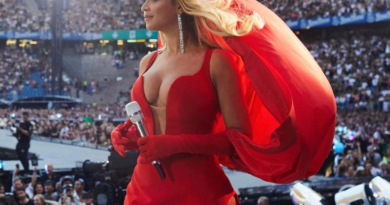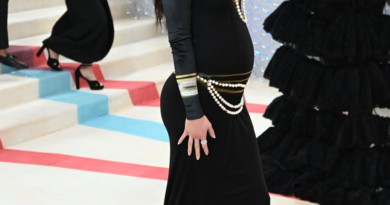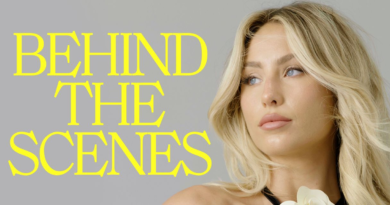Imaan Hammam Is Making Plans
Taped to Imaan Hammam’s refrigerator, along with photos of friends and family and snapshots from her world travels, is a piece of graph-lined paper with “2023” written at the top, then a list of the things the 26-year-old model hopes to do this year: learn a new language (she already speaks Dutch, Arabic, and English); apply for Global Entry (underlined twice for emphasis); look for a therapist (“I’ve done it and I think it’s time for me to do it again,” she tells me).
I am only privy to this list because the handyman assembling Hammam’s new dresser is taking longer than expected to finish; we’ve nixed our plans to meet at a coffee shop, and Hammam has invited me over to her Brooklyn apartment instead. “Islam” is written on the list, too. “I’m very proud to be Muslim,” she says, “but it’s so hard to be in a Western country and still stay close to your deen, your religion.”
This particular afternoon is day 13 of Ramadan, and in keeping with her 2023 priorities, Hammam has taken the month off from modeling to focus on her faith, which right now includes fasting from sunup to sundown. “I [told] my agent, ‘I love you guys, but this is a month of me healing, no work,’” she says, adding that she’s pushed herself too far during Ramadan before. “There were moments when I fainted on set. They’d be having you doing so much on these shoots, girl. It’s like dancing, jumping around, running—and then there’s a room for TikTok, doing all these TikTok videos….” Sitting on a plush rug on her living room floor, wearing wide-leg jeans and an oversize green sweatshirt, Hammam has a spirited, inviting demeanor, her delivery marked by laughs and hand gestures and frequently tilting her head to the side.
Hammam is 10 years into the whirlwind of being one of fashion’s most in-demand models. Born and raised in Amsterdam to a Moroccan mother and Egyptian father, she was scouted at 13, signed her first contract at 16, and “it just got crazy from there,” she says. As much as she tried to balance work and school—going to class when she was home and joining via Skype when she was traveling—she admittedly “put [school] on the back burner,” she says. Encouraged by high-profile figures in fashion, she moved to New York, made her debut walking Jean Paul Gaultier’s fall 2013 couture runway, and opened Riccardo Tisci’s spring 2014 Givenchy show. In the years since, she’s graced dozens of magazine covers, starred in campaigns for Chanel and Versace, and collaborated on collections with Frame and Port Tanger. Earlier this year, she added one of modeling’s most esteemed and covetable jobs to her portfolio when she was selected as the newest face of Estée Lauder.
“This dream to be an Estée woman was always kind of in the back of my mind,” she says. “I was like, ‘If you’re an Estée woman, that’s it, you’ve done it. Done; mic drop.’” Being the brand’s first Afro-Arab ambassador makes the contract especially meaningful. “[This is] the representation that we need,” she says, “and it’s just awesome.”
The first campaign photos are images a younger Hammam would have appreciated. “I didn’t really see the representation of women who looked like me, so it was very hard for me to think I was beautiful,” she says. Her ascent to supermodel-dom has coincided with scrutiny of the fashion industry’s historic lack of diversity, but also with its strides toward greater inclusion. “We can always do better,” she says of the efforts, but in the decade since she started her career, she’s noticed a change. “Now, if you look at most magazine covers, if you look at campaigns, you see a lot of diversity, and that makes me really happy. [I’m] very proud to be one of the women who maybe helped with that.”
The career that Hammam is deservedly proud of has allowed her to travel the globe and support her once-struggling family. (“Sometimes we didn’t eat for a week,” she says of her upbringing.) But does she ever feel like modeling conflicts with her identity as a Muslim woman?
“Constantly,” she says. “From the beginning of my career, my mom always said, ‘I want you to do this, but do it in a way where it’s always respectful to yourself and to our religion.’ I went to this event not so long ago, and I wore this look, and my mom was not happy about it. I find myself in the middle all the time,” she says, lowering her gaze and shaking her head.
Still, Hammam is keenly aware of how influential her visibility is, and passionate about using it for good. “Nowadays with social media, you’re able to be more than just a beauty and a model; you’re also able to share your thoughts and share what you believe in,” she says. “[Using] my platform to just simply talk about who I am—being Moroccan-Egyptian, being Muslim—that alone is already helping so many people.” Helping them to feel seen, she says, and to confidently chase their dreams.
As Hammam has pursued her own dreams, she’s been fortunate to do so alongside a supportive group of close friends and fellow models, among them Cindy Bruna, Ophélie Guillermand, Mélodie Monrose, and Leila Nda. Early in her career, she found a mentor in Bethann Hardison. “When I first met her, I fell in love immediately,” Hardison says. “She has this kind of beauty that you don’t get tired of, [and] she learned to have a presence at everything she does—whether it be in print or on the runway. She really learned to be a great model.”
For a teenage Hammam, connecting with Hardison was pivotal. “At that time, everything was so competitive,” Hammam says of the dynamic among Black models at castings. “I would walk into a room and I would be super friendly—‘Hey, what’s up? I’m Imaan’—[but] they weren’t really trying to be friends.” In retrospect, she realizes that the icy reception had little to do with her, and more to do with the fact that houses were rarely casting more than one Black model for a show. “It makes sense. If only one girl’s being picked, of course you’re going to feel some type of way.”
To encourage a sense of camaraderie among emerging Black models, Hardison put a bunch of them together on a group chat and regularly invited them to dinner. “She made sure we all came together and sat,” Hammam remembers, “and we would go to fancy-ass restaurants. She’s bougie, which I love about her. We’d show up at The New York Edition hotel—it’s 20 models—and we would rent this room upstairs [and] just sit around and talk. I think that was so beautiful and so nice. She’s a legend. She’s opened so many doors for women of color, and still does today.” Hammam, Hardison says, more than seized her opportunities—she worked tirelessly, not only to elevate and sustain her career, but also to embody the sense of unity her mentor hoped to establish. “She’s not a girl who is looking to compete with anybody,” Hardison says. “She’s a girl who is looking to compete with herself and bring the others along.”
Though Hammam “used to be out in the streets a lot,” frequently going out dancing, she’s been spending much more time at home recently, in the apartment she bought six years ago. “I don’t know if it’s me being a Libra, but I get bored really quickly of furniture and colors and things. I change it up every half year.” Currently, two dark green velvet couches are planted in her living room. Vaulted ceilings and massive windows make for a space flooded with light. She plans to get rid of the hanging chair next to the credenza; “that was one of those Pinterest dreams,” she says. A City of God poster and a photo of her taken by Moroccan artist Hassan Hajjaj lean against a wall, to be hung up in the days to come. “Honestly, my apartment is my safe space, my safe haven,” she says. “I love spending time here.”
If you follow Hammam on TikTok, perhaps you’ve seen glimpses of her open kitchen, where she and fellow model Monrose film themselves cooking. Letting the camera roll while making a mango kunafa tart and Egyptian macaroni béchamel has proven to be a manageable content venture amid a social media–fueled culture that often stresses her out. “Sometimes I get crazy DMs saying, ‘You’re going to hell, you’re selling your body.’” It doesn’t bother her to the extent that it did when she was a teenager, but “I can’t sit here and be like, ‘Oh, it’s not doing anything to me,’” she says. “That’s something that is really sad about social media.” On the other side of that coin, though, are some pinch-me interactions—like Hammam connecting in her DMs with one of her all-time favorite models, Yasmeen Ghauri. During one exchange, Ghauri asked Hammam how she learned her runway walk. “I’m like, ‘Girl, from you!’”
Before Hammam resumes those walks and finds herself on set, she’ll be spending time with her family in Morocco (she is one of six children from a blended family). And given her innate curiosity, the refrigerator list back in New York seems likely to keeping growing. Hammam volunteers with the Asiyah Women’s Center—an organization that provides support and shelter for women impacted by domestic violence—and frequents the Islamic Center at NYU for Friday prayer and lectures from its imam, Khalid Latif. She is taking a Business English course through online platform Perfectly Spoken and is learning Brazilian jiujitsu. “I’ve taken one class, and it was crazy,” she says, going on to recount practicing choke holds on a man in what sounds like an MMA match. She wondered if it was too intense for her. “I was like, ‘Okay, I don’t know if this is what I should be doing.’” But she can’t resist doing something new. “I’m still going to do it, because I think it’s a fun sport.”
Hair by Hos Hounkpatin at The Wall Group; makeup by Frank B for Home Agency; manicure by Maki Sakamoto at The Wall Group; set design by Marla Weinhoff Studio; produced by Serlin.
This article appears in the August 2023 issue of ELLE.
Leah Faye Cooper is a New York City-based fashion writer and contributing editor at Vanity Fair. Her work has appeared in ELLE, Harper’s Bazaar, W and The Hollywood Reporter. She is currently working on her debut book, Full-Court Dress, chronicling the rise of the NBA as a fashion powerhouse.




















